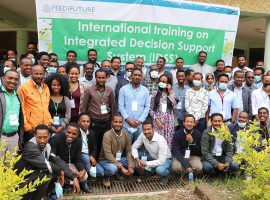Africa Center of Excellence for Climate Smart Agriculture and Biodiversity Conservation (ACE Climate SABC) has successfully organized an International Training on Integrated Support System (IDSS) in collaboration with various partners: Feed the Future, Livestock Innovation Lab (LSIL) and Innovation Lab for Small Scale Irrigation (ILSSI) based at Texas A&M University System in the USA. The training was led by trainers from Texas A&M University supported by those who come from Bahir Dar University.
The Deputy Leader of ACE Climate SABC, Dr. Bobe Bedadi has chaired the opening session of the training and invited the President of Haramaya University to officially open the training. The President, Dr. Jemal Yusouf, has welcomed the participants virtually and mentioned that organizing such kind of international training is a great opportunity for the University and every participant should get the best out of it while enjoying the historical city of Harar with its diverse cultural heritages during their stay.
The Training and Research Head at the Center Dr. Sintayehu Workeneh, has also welcomed the participants and said, the ACE Climate SABC was established as an academic and research hub for the Eastern and Southern Africa region with a competitive loan grant obtained from the World Bank and has been training MSc and PhD students coming from different countries of the region since it was operationalized in October 2017.
The training was composed of three different models, namely: Agricultural Policy Environmental eXtender Model (APEX) for hydrologists, agronomists and soil scientists; Farm Income Simulator Model (FARMSIM) for agricultural economists; and Soil and Water Assessment Tool (SWAT) for hydrologists and agricultural engineers. According to Dr. Yihunedile Tadele, a lead trainer and a researcher in the Project of Innovation Laboratory for Small Scale Irrigation (ILSSI) at Texas A&M University system, the overall objective of the training is to develop local capacity on biophysical and socioeconomic modelling to assess the impact of irrigation and land management on agricultural production and environmental sustainability, income and nutrition sustainability. In his view, integrating the multidisciplinary models is an important output of the training for the integration help boost agricultural productivity as it enables the assessment of the overall impacts of irrigation, land management on production and nutrition including environmental sustainability.
During the rap up session facilitated by Dr. Mulugeta Damie, the Project Manager at the ACE Climate SABC, the trainees have expressed high level of satisfaction and happiness with the knowledge and skills acquired from the training and they have taken and were thankful to the Center, LSIL and ILSSI for jointly organizing such an invaluable training workshop. The trainers also expressed their gratitude to the Center for the wonderful organization of the workshop.
The participants are mainly from research institutes, PhD and MSc students from different universities and academicians and researchers from different universities. They were alienated into three separate and parallel sessions according to their fields of studies and area of training interests. According to the participants, having training on such models is a good opportunity and the training was coordinated by the organizers and handled by the trainers nicely. The trainees expressed that they were very happy to the whole aspects of the training.
The Vice President for Academic Affairs and the Center leader, Prof. Mengistu Urge and Vice President for Research Affairs and former Training and Research Head at the Center, Dr. Tesfaye Lemma, were invited to close the training workshop. Prof. Mengistu says, every hour we were following the progress of the training and now we are very happy that it was successfully completed, and he thanked the trainers for coming to give this timely training. Dr. Tesfaye, on his part said that it had been a long time that they had started communicating to organize the training with Dr. Yihunedile, however, it had been delayed because of the security problems and the lockdown following the outbreak of Corona pandemic. He said the training had materialized because of the firm commitment of Dr. Yihunedile and presently they all are happy that the training workshop had been successfully conducted.
